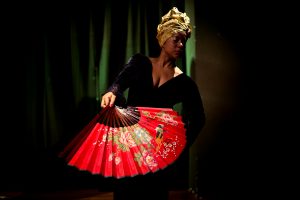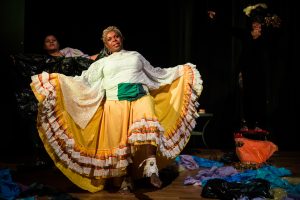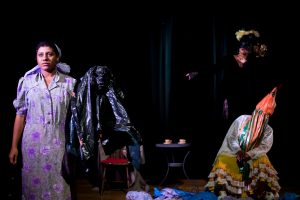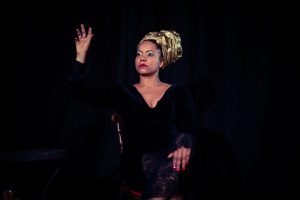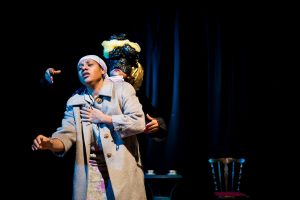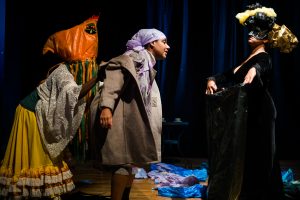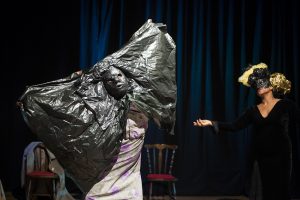CAROLINA, I COUNTED THE STAINS OF THE LEOPARD UNTIL I ARRIVED ON THE MOON is the assembly of the company We Are not Whoopi Goldberg, whose ethical and artistic objective is to give voice, visibility and representation to an imaginary that is part of the universal history but that is often relegated in oblivion or in the margins: negritude.
For this ocasion NO Somos Whoopi Goldberg have invited the playwright and director Eva Hibernia to create a triptych of voices.
CAROLINA, I COUNTED THE STAINS OF THE LEOPARD UNTILL I ARRIVED ON TO THE MOON, is the first part of that triptych. Take as a reference figure Carolina María de Jesús, writer of Brazilian origin
Synopsis:
Last hours of Carolina María de Jesús. The writer is alone in her house, with her hen, Clotilde. The knocking on the door of a mysterious woman unlocks memories as a flow that takes us from the present to the past, in a constant sway and in a foreboding of the future: personal, historical, social and even transcendental future. The monologue becomes a (music) score punctuated by the cackling of the hen and the mysterious language of the woman who has entered the space. When Carolina finally crosses death we will enter the kingdom of this, in a space-time-language where there is more life and new opportunities.
About Carolina María de Jesús: Born in 1914 in one of the poorest rural regions of Brazil, she emigrated very young to Sao Paolo with the hope of finding a better life. However, like many other emigrants, she had to settle for the horizon of the favela and the collection of garbage as a means of subsistence. Despite that Carolina had only enjoyed two years of schooling, she had confidence and a love for language that made her intimately desire to become a writer. For that reason she collected all the paper she could find and created several journals in which she recorded her life in the favela. She never married although she brought three children into the world. The fortuitous encounter with the journalist Audálio Dantas, who was in charge of making a reportage about the favelas, changed her life. Audálio supported her writing and made sure that her writing was known, first in the newspapers and later he helped her to publish her first book. Carolina’s first book, Cuarto de Deshechos, was a success. The first edition of 10,000 copies was sold out in a week and was translated into 13 languages. Despite that she wrote and published three books while she was alive and left a large amount of unpublished work that is still cataloged today, she died in poverty, alone, although her goal of getting out of misery and the favela was fulfilled.
Text: Eva Hibernia
Text of the work: Eva Hibernia (from the work and documentation on Carolina María de Jesús and the experiential writing laboratory conducted with No somos Whoopi Goldberg)
Dramaturgy and direction: Eva Hibernia
Interpreters:
Carolina Maria de Jesus: Kelly Lua
Hen: Silvia Albert Sopale
Madame La Mort: Maisa Sally-Anna Perk

